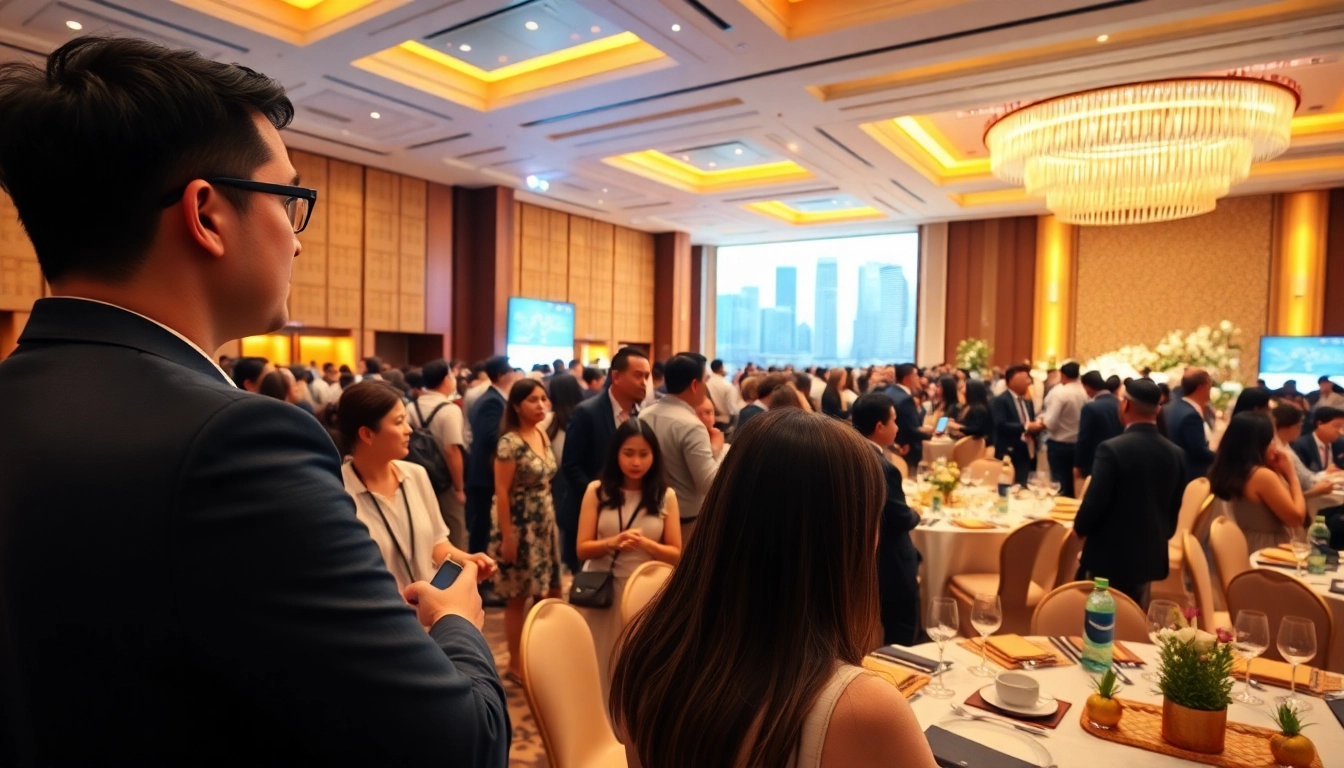Understanding the Role of a Corporate Event Organizer Singapore
In today’s fast-paced business environment, organizing an impactful corporate event is essential for many organizations. A Corporate event organizer Singapore plays a critical role in bringing together logistics, creativity, and strategic planning to create memorable experiences. This section delves into what you can expect from a corporate event organizer and highlights their importance in achieving seamless event execution.
What to Expect from Corporate Event Organizer Singapore
When you engage a corporate event organizer in Singapore, you can expect a comprehensive service that includes everything from initial conceptualization to post-event evaluations. The organizer should understand your objectives, target audience, and brand identity. They will proactively communicate with you throughout the planning process and offer suggestions to enhance the event experience.
Key Responsibilities of an Effective Organizing Team
The responsibilities of a corporate event organizer typically encompass a wide range of tasks, including:
- Concept Development: Crafting the overarching theme or message of the event.
- Vendor Coordination: Sourcing and managing suppliers for catering, audiovisual, and other services.
- Budget Management: Setting and adhering to a budget to ensure financial efficiency.
- Logistical Planning: Overseeing all logistical aspects, including transport, accommodation, and venue setup.
- On-site Management: Being present during the event for troubleshooting and coordination.
Importance of Target Audience in Event Planning
Understanding the target audience is crucial for any corporate event. The organizer should define the demographic details of attendees, including age, profession, interests, and preferences. This information will guide every aspect of the event, from venue selection to program scheduling, ensuring that the event resonates with the audience.
Planning an Impactful Corporate Event in Singapore
At the heart of a successful corporate event lies meticulous planning. This section discusses essential steps that a corporate event organizer in Singapore should take to ensure that every detail is covered.
Essential Steps for Corporate Event Organizer Singapore
Each event will have its unique requirements, but generally, the following steps are vital:
- Define Objectives: Establish clear goals for the event (e.g., networking, product launch, or team building).
- Event Format: Decide on the format of the event, whether it’s a conference, seminar, workshop, or social occasion.
- Assemble a Project Team: Gather a team with diverse skills to handle various aspects of event planning.
- Create a Master Plan: Document timelines, responsibilities, and action steps for each part of the planning process.
Creating a Comprehensive Event Timeline
A well-structured timeline is a cornerstone of effective event planning. Start with a checklist that includes key milestones and deadlines, covering tasks like venue booking, vendor contracts, and promotional activities. Utilize project management tools to maintain visibility into the progress of each task.
Budgeting for a Successful Event
Successful events hinge on effective budgeting. Outline all potential costs, including venue hire, catering, entertainment, marketing, and contingency funds. It’s important to track expenses diligently to prevent overspending. Regular budget reviews should be incorporated into your planning process.
Selecting the Right Venue for Corporate Events
The choice of venue can significantly impact the success of a corporate event. This section outlines the critical considerations when selecting a venue in Singapore.
Criteria for Choosing a Venue in Singapore
Key factors to consider when selecting a venue include:
- Location: Choose a venue that is easily accessible to your target audience.
- Capacity: Ensure the venue can comfortably accommodate your estimated number of attendees.
- Amenities: Check for necessary facilities such as AV support, Wi-Fi, and breakout rooms.
- Aesthetic Appeal: A visually appealing venue enhances the attendee experience and aligns with the event’s theme.
Logistics and Accessibility Considerations
Managing logistics effectively involves planning for attendee transport, parking facilities, and accommodation options for out-of-town guests. Ensuring that the venue is accessible for individuals with disabilities is not merely a consideration; it is a necessity to ensure inclusivity.
How Venue Affects Attendee Experience
The choice of venue influences the overall atmosphere and experience of the event. A well-chosen venue can stimulate engagement, foster networking, and create lasting memories for attendees. Pay attention to layout, lighting, and other factors that contribute to the event vibe.
Engaging Attendees: Innovative Ideas for Events
Engagement is key to a successful event, and innovative ideas enhance interaction while making the experience memorable. Below are some strategies that can help captivate your audience.
Using Technology to Enhance Interaction
Incorporating technology, such as mobile apps for event schedules, live polling, and Q&A sessions, allows attendees to participate interactively. Consider using virtual reality experiences, augmented reality displays, or live-streaming options to bring remote participants into the fold.
The Role of Networking Activities
Facilitating networking among attendees is crucial for fostering connections. Organize structured networking sessions or ice breaker activities to encourage participants to mingle and exchange ideas. These targeted moments elevate engagement and lead to meaningful conversations.
Creating Memorable Experiences for Attendees
Memorable experiences can set your event apart. Personalize elements such as welcome kits, provide unique food and beverage options, or include interactive stations for attendees to explore aspects of your brand. Engaging storytelling can also captivate audiences and connect them emotionally to your theme.
Measuring Success: Evaluating Your Corporate Event
Measuring the success of a corporate event involves carefully assessing various performance metrics. Understanding what worked and what didn’t will inform future events and improve outcomes.
Defining Key Performance Metrics for Events
Identifying key performance indicators (KPIs) is crucial. Metrics might include registration numbers, attendance rates, audience satisfaction levels, and social media engagement. Establish benchmarking methods to compare data with previous events.
Post-Event Feedback Collection Strategies
Feedback should be actively sought after the event. Utilize surveys, feedback forms, or interviews to gather insights from attendees and vendors. Understand their experiences to identify areas for improvement and strengths to build on.
Adjusting Future Plans Based on Evaluations
Reviewing collected feedback and performance metrics is an essential step in refining future events. Adjust your planning strategies accordingly to cater to audience preferences and expectations. Continuous improvement is key to becoming a sought-after corporate event organizer.
